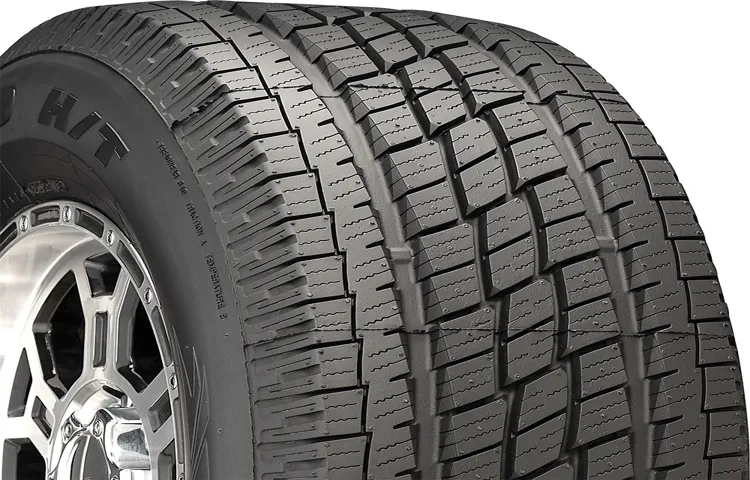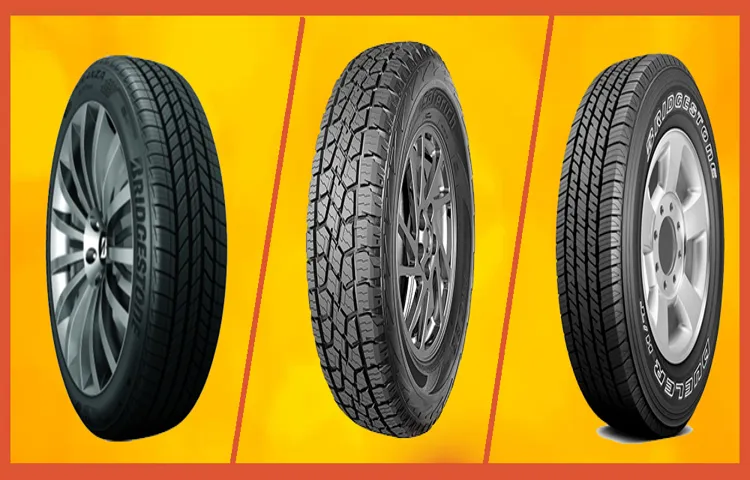Looking for the right tires can be a bit perplexing, especially if you’re not familiar with all the available options. And if you’re in the market for new tires for your vehicle, you may be wondering what exactly a highway tire is. Well, look no further, because we’ve got you covered.
Simply put, a highway tire is a type of tire specifically designed for use on paved roads. Think of it as a tire made for the open road, with features such as smoother ride, better handling, and improved fuel efficiency. These tires are optimized for use on highways and freeways, providing drivers with a comfortable and safe ride, even at high speeds.
So, what makes a highway tire different from other types of tires? Unlike all-terrain or off-road tires, highway tires are designed to handle mainly pavement and asphalt. They’re made from a harder rubber compound which provides better durability and resistance to wear. Additionally, compared to other types of tires, highway tires have shallower tread depths, which makes them quieter on the road and reduces rolling resistance, resulting in increased fuel efficiency.
Highway tires come in various sizes, treads, and patterns to suit different driving styles and weather conditions. On the whole, though, they’re an excellent choice for drivers who primarily use their vehicle for commuting, long distance traveling, and other highway driving. In short, if you spend most of your time cruising down the open road, then a highway tire might be just what your vehicle needs.
Table of Contents
Overview
A highway tire is a type of tire designed for high speed and long distance driving on paved roads, typically used on passenger cars, SUVs, and light trucks. These tires are built to provide optimum performance and comfort on the highway, offering a smooth and quiet ride. The treads of a highway tire are usually shallow and symmetrical, optimized for better fuel efficiency and improved handling in dry and wet conditions.
They are also made with harder rubber compounds that can endure high temperatures and wear better on smooth pavements, allowing them to last longer than other types of tires. Highway tires are ideal for daily commuting, long distance travel, and highway driving because they offer excellent stability, reduced noise, greater cornering ability, and improved fuel efficiency. Overall, if you do a lot of highway driving, investing in a set of highway tires can make a significant difference to your vehicle’s performance and safety on the road.
Description of highway tires
Highway tires are designed specifically for driving on highways and other paved roads. These tires are engineered with features that ensure a smooth, quiet ride with excellent handling and grip on dry or wet roads. They are optimized for high speeds and long distances, making them ideal for road trips, daily commutes, and other highway driving.
One of the key features of highway tires is their tread pattern, which is designed to maximize contact with the road surface and provide excellent traction in all weather conditions. Additionally, highway tires are typically made from durable materials that offer excellent resistance to wear and tear, making them a cost-effective choice for drivers who do a lot of highway driving. Overall, these tires are an excellent option for anyone looking for a safe, reliable ride on paved roads.

Benefits of highway tires
Highway tires are designed for vehicles that travel long distances and at higher speeds, making them ideal for freeway or highway use. These tires have a unique tread pattern that helps to maintain grip on dry roads, while also providing stability and control. They have a hard compound that allows them to withstand the rigors of high-speed driving, making them more durable than other types of tires.
Another benefit of highway tires is that they provide better fuel efficiency due to their lower rolling resistance. This means that they require less energy to move, reducing the amount of fuel needed to propel the vehicle forward. So, if you’re a frequent highway driver, opting for highway tires could save you money in the long run on both fuel and tire replacement costs.
Types of Highway Tires
If you’re someone who spends a lot of time driving on highways, it’s important to know what highway tires are and what types are available. A highway tire is designed specifically for use on highways, with a focus on providing a smooth ride, good handling, and high-speed performance. There are a few different types of highway tires to choose from, including all-season, summer, and winter variants.
All-season highway tires are a popular choice because they offer good performance in a variety of weather conditions. Summer highway tires are designed specifically for warm weather driving, with a focus on providing good handling and grip. Winter highway tires, on the other hand, are built to handle cold and snowy conditions.
They offer superior traction and grip on snow and ice, making them an excellent choice for drivers who frequently deal with harsh winter weather. Overall, the type of highway tire you choose will depend on your personal driving needs and the weather conditions you’re likely to encounter.
All-season highway tires
When it comes to highway driving, having the right set of tires can make all the difference. One popular choice among drivers are all-season highway tires. These tires are designed to provide reliable performance in a variety of weather conditions.
But there are also different types of highway tires to choose from. For example, touring tires are ideal for long road trips as they offer a smoother ride and reduced road noise. Performance tires, on the other hand, are specifically designed for sporty handling and agility, making them perfect for those who prioritize speed and precision.
Regardless of the type of highway tire you choose, it’s important to select one that matches your driving style and the conditions in which you’ll be driving. With the right set of tires, you’ll be able to enjoy a safer and more comfortable ride on the road.
Summer highway tires
Summer highway tires come in different types in order to provide drivers with the ideal tire that best suits their driving needs. There are touring tires, which offer comfort and a quieter ride, ideal for long-distance travels. Performance tires, on the other hand, provide better handling and improved braking for spirited drivers.
If you’re looking for stability and durability, all-season tires can also perform well on the highway. For hot summer weather, summer tires are specially designed to provide better traction in dry conditions and are ideal for high-speed driving. It’s important to note that summer tires are not designed for cold and wet weather, so it’s important to switch to all-season or winter tires when the temperature drops.
Regardless of which highway tire type you choose, make sure to have them properly inflated and well-maintained for optimal road safety.
Winter highway tires
When it comes to winter driving, your choice of tires can make all the difference. There are several types of highway tires to choose from, each with its own unique features designed to handle cold, snowy road conditions. The most popular options for winter highway tires include studded tires, performance winter tires, and studless ice & snow tires.
Studded tires feature metal studs that provide excellent traction on ice, while performance winter tires offer a softer rubber compound for better grip on snow and ice. Studless ice & snow tires are designed with specialized tread patterns that help grip icy surfaces. No matter which type of winter highway tires you choose, they will help you stay safe and in control on those treacherous winter roads.
So, before the cold weather arrives, make sure to equip your vehicle with the appropriate tires for the season.
Features of Highway Tires
Highway tires are designed for use on the highway and are best suited for vehicles that do a lot of driving on paved roads. These tires are characterized by their unique features that set them apart from other types of tires. For instance, highway tires have narrower tread grooves and shallower tread depths, which provides for better stability and traction on dry roads.
Additionally, they have a higher speed rating, which enables them to handle high speeds without compromising on safety. Other notable features of highway tires include reduced rolling resistance, which improves fuel efficiency and the noise reduction technology that reduces tyre noise and offers a more comfortable ride. In summary, highway tires are ideal for drivers who need a reliable tire that can handle high speeds, provide excellent handling, and offer a comfortable and quiet ride.
Tread design
Highway tires are designed to provide excellent performance and reliability on smooth and dry roads. One of the essential features that make highway tires stand out is their tread design. These tires feature circumferential grooves that allow water to be directed away from the tire’s contact patch.
This design enhances the tire’s ability to resist hydroplaning, which is critical in wet conditions. Moreover, highway tires have smaller tread blocks to increase their contact patch with the road. This feature enhances their stability on highways, providing drivers with better handling and cornering ability.
Highway tires’ tread design also reduces noise and vibrations, providing a comfortable ride for passengers. Overall, these features make highway tires the perfect option for drivers who spend most of their time driving on highways and smooth roads.
Tread compounds
One important feature of highway tires is their tread compounds, which affect their performance in different conditions. Generally, highway tires are designed with a harder tread compound that provides better durability and resistance against wear and tear. This means the tires can last longer and handle long stretches of highways without the need for frequent replacements.
However, harder compounds also mean less traction and grip on wet roads, which can be dangerous for drivers. To address this, some highway tires incorporate softer compounds in their treads to improve their grip and traction. But softer compounds also mean quicker wear and tear, so it’s a trade-off between better performance and durability.
When choosing highway tires, it’s important to consider the conditions you’ll be driving in and find the right balance between durability and performance to ensure your safety on the road.
Conclusion
A highway tire is like the ultimate road trip partner. It’s dependable, efficient, and designed to handle everything from smooth highways to bumpy back roads. It’s the tire that won’t let you down when you need to get from point A to point B with ease.
So, the next time you find yourself cruising down the open road, take a moment to appreciate the humble highway tire that’s helping you along the way.”
FAQs
What is a highway tire?
A highway tire is a type of all-season tire designed for use on highways and other paved roads. It typically has a tread pattern optimized for traction on dry or wet surfaces, as well as a stiffer construction for stability at high speeds.
How is a highway tire different from other types of tires?
Compared to off-road tires or winter tires, highway tires typically have a smoother and quieter ride on pavement, as well as better fuel efficiency. However, they may not perform as well in off-road or snowy conditions.
What are the benefits of using highway tires?
Some benefits of using highway tires include improved handling and stability at high speeds, better fuel efficiency, and a longer lifespan compared to other types of tires. They are also typically more affordable than specialized tires.
Can highway tires be used in winter conditions?
While highway tires are not specifically designed for winter conditions, some models are rated for use in light snow. However, for more severe winter weather, it is recommended to use dedicated winter tires for maximum safety.
How often should I replace my highway tires?
The lifespan of highway tires can vary depending on factors such as driving style, vehicle weight, and climate. It is generally recommended to replace tires every 5-6 years, or sooner if they show signs of damage or excessive wear.
How can I choose the right highway tire for my vehicle?
When selecting highway tires, some important factors to consider include the tire size, load index, speed rating, and tread pattern. It is also a good idea to research customer reviews and ratings to find a tire that fits your specific driving needs.
Can I mix highway tires with other types of tires on my vehicle?
While it is possible to mix tire types on a vehicle, it is generally not recommended for optimal safety and performance. It is best to replace all four tires with the same type and model to ensure consistent handling and traction.



